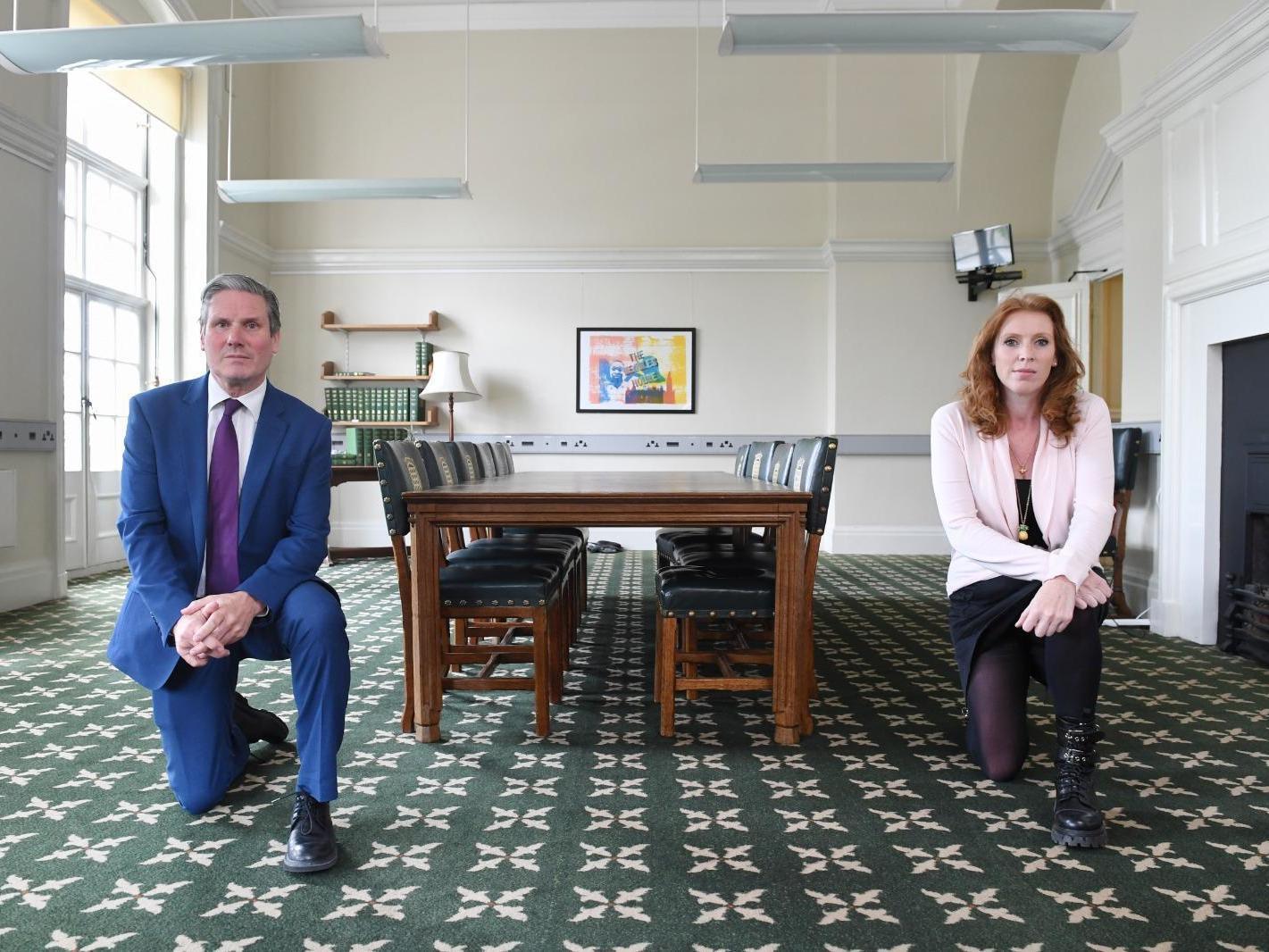Black Lives Matter: Keir Starmer takes knee in solidarity with ‘all those opposing anti-black racism’
Senior opposition politicians adopt protest stance ahead of George Floyd’s funeral
Labour leader Sir Keir Starmer and deputy Angela Rayner have taken the knee in solidarity with “all those opposing anti-black racism”.
The senior opposition MPs adopted the stance synonymous with the Black Lives Matter movement as demonstrators met in Parliament Square to mark George Floyd‘s funeral at 5pm on Tuesday.
It came after Westminster held a minute’s silence for Floyd, whose death in Minneapolis custody has sparked global protests against systemic racism and police brutality.
Speaking after the minute’s silence, Sir Keir said of George Floyd: “He must not become just another name. His death must be a catalyst for change.”
The official Downing Street spokesperson revealed that the prime minister and his cabinet did not take part in the minute’s silence, but that Boris Johnson had told ministers there is “so much more to do in eradicating prejudice and creating opportunity”.
“The PM began Cabinet by discussing the anger and the grief that is not just felt in the US but around the world including the UK following the death of George Floyd,” the spokesperson said.

“He said those who lead and govern simply cannot ignore the depth of emotion that has been triggered. The PM said there was an undeniable feeling of injustice and that people from black and minority ethnic groups do face discrimination in education, in employment and in the application of criminal law.
“The PM said we’re a much, much less racist society than we were but we must also frankly acknowledge that there’s so much more to do in eradicating prejudice and creating opportunity.”
Despite coronavirus fears, tens of thousands have turned out to protest in the UK in the wake of Floyd’s death in Minneapolis police custody, after officer Derek Chauvin pressed his knee into the handcuffed African-American’s neck for nearly nine minutes despite Floyd’s cries of “I can’t breathe” before losing consciousness.
Protesters have highlighted that institutional racism is not endemic to the US, pointing to the higher coronavirus death rate among ethnic minorities, and the disproportionate rates of stop and search, arrests and use of force which black people face at the hands of England’s police.
Health secretary Matt Hancock faced accusations of “ignorance” after claiming: “Thankfully, this is all based in response to events in America rather than here.”
The prime minister – who has on multiple occasions used language condemned as racist – on Monday insisted that the UK is “not a racist country”, as he warned that demonstrations had been “subverted by thuggery”.
His comments came in response to scuffles with police in central London, which prompted mounted police to charge at protesters, and the toppling of the statue of prolific slave trader Edward Colston in Bristol.
Home secretary Priti Patel branded the “utterly disgraceful” action an example of “sheer vandalism and disorder”, and reportedly had a “firm” discussion with Avon and Somerset Police’s chief constable, Andy Marsh, over the decision not to intervene.

While Downing Street has threatened that anyone who topples further statues “will face the full force of the law”, the Colston memorial’s dunking into Bristol harbour has sparked a wider debate about Britain’s colonialist past.
Hours after Sadiq Khan unveiled a commission to review all of the London’s statues, it was announced that all Labour councils across England and Wales would start work with their communities to review “the appropriateness” of monuments and statues in their areas.
Meanwhile, peaceful demonstrators in Oxford jammed roads on Tuesday, calling on the university to remove an effigy of white supremacist Cecil Rhodes.
Sir Keir has sparked growing opposition within his party after telling LBC that, while Colston’s statue “should have been removed from our streets a long time ago ... it shouldn’t have been done in that way”, which he said was “completely wrong”.
However, he has urged Mr Johnson to seek protection for US protesters, calling on the prime minister to challenge Donald Trump to "respect human rights".
In his letter, the Labour leader asked what the government was doing to ensure the UK exports "are not being used in the suppression of democratic rights" amid growing calls for ministers to end the sale of riot gear and rubber bullets to the US.
The prime minister told the Commons that “the UK is possibly the most scrupulous country” in the world regarding arms exports, adding he was “happy to look into any complaints”.
Join our commenting forum
Join thought-provoking conversations, follow other Independent readers and see their replies
Comments
Bookmark popover
Removed from bookmarks